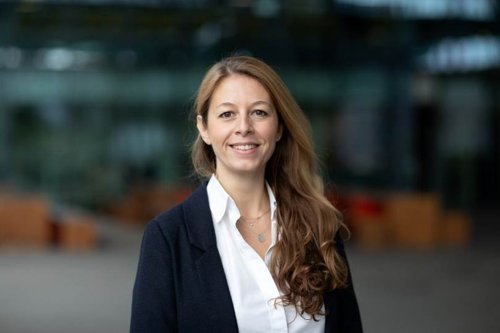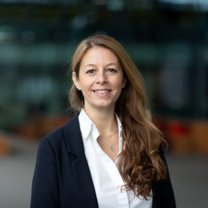Meet our Energizer! Diletta Giuntini
Diletta Giuntini is originally from Florence, Italy. She earned her PhD at San Diego University. She continued her academic career in the US before taking an outstanding opportunity to pursue her research interests at Hamburg University of Technology. There, she worked on long-term projects supported by a Humboldt Fellowship (2018) and later became PI in Hamburg’s interdisciplinary research centre (SFB) on Tailor-made Multiscale Materials Systems. This allowed her to further develop her interests in materials science, particularly ceramics, additive manufacturing, and sintering - the process of densifying particles using heat, light, or an electrical current.
Nowadays Diletta Giuntini is a tenured Assistant Professor in the Mechanics of Materials section of the Department of Mechanical Engineering at Eindhoven University of Technology.

Picture: Eindhoven University of Technology
New materials that withstand harsh conditions
Diletta: “In our research group, I bring in expertise on materials that are hard to manufacture. I am especially interested in engineering ceramics. I find these materials fascinating because they achieve combinations of properties that no other material can feature, they can withstand extremely harsh working conditions, and they even have a very broad spectrum of functionalities.”
When you think of materials science in relation to energy, examples include fuel cells, electrolysers, solar cells and batteries. These components are most efficient if made to be resistant to high temperatures and harsh environmental conditions. The aim is for them to function in the long term. However, manufacturing these materials is extremely difficult.
Diletta explains: “Controlling geometries at the nano and micro levels as we manufacture these materials is essential for their performance. Take fuel cells, for example. These are usually made up of several components, with each layer having a different function. A very efficient solution is to manufacture these different layers simultaneously. However, internal stresses and fracture are a serious downside of this process. Therefore, I am working on developing both very hard-to-break ceramic materials and manufacturing methods that aim to create materials that can withstand harsh conditions. Specifically, I study ingredients and geometry, as well as design and manufacturing processes at nano and micro scales.”
Finding a common language to drive innovations
During her time at Hamburg University, Diletta worked in close vicinity to other scientific disciplines, such as physics and chemistry. This experience has shaped her belief that a multidisciplinary approach is the key to overcome challenges in the design and production of innovative materials.
However, finding a common language is very difficult. According to Diletta, understanding the common ground and your own assumptions regarding the knowledge that others have is key to developing mutual understanding, a process that can easily take six months.
“Building a common language between physicists, chemists and materials scientists is worthwhile, but it's difficult to maintain in our current reality of working towards tangible results and impact. In my opinion, we are underfunded to develop this way of working.”
Exploring novel scientific ideas – building a knowledge reservoir
The path science is headed towards nowadays strikes a chord with Diletta. On the one hand, her work directly contributes to the energy transition by creating materials that can withstand unsparing conditions while performing better. On the other hand, Diletta also has a clear vision of what science should be: the pursuit of knowledge both for its own sake and for the benefit of society.
Diletta Giuntini and Davoud Jafari, University of Twente, recently worked on creating a graded material for solid oxide fuel cells. To this end, they designed inks containing different combinations of nickel and oxides. They then used 3D printing to create layered structures from these inks, precisely controlling the geometry, and then finalized the process with innovative and ultra-efficient densification technologies.
Diletta: “When obtaining data from these experiments, I continually ask myself: “What can we know from the data? What leads to our observations?” My job is to expand our knowledge of the basic principles underlying the experiments. Even though this approach might appear less result-driven, I am convinced that finding the ‘why’ and exercising critical thinking is a key step towards true innovation. This way, theory development can clearly inform improved process predictions, modelling, and optimisations.”
Diletta continues: “Growing the scientific body of knowledge is a clear personal priority of mine, which is why I’m member of the board of the Eindhoven Young Academy of Engineering. This group suggests ideas for improvement to science and technology in the broadest sense, and I can contribute by sharing my personal experiences from the US and Hamburg.
Supporting bottom-up ideas is crucial. I advocate for structural funding for faculty members to explore bold ideas and develop crucial expertise – which could also provide relief in the current heated competition for research funding. And multidisciplinary and curiosity-driven research should play a larger role in scientific practice. To keep innovating and solving important societal challenges, we need to stay creative.”
New solutions go hand in hand with unforeseen challenges
For Diletta, the reason for her contribution to the energy transition is clear: it is an urgent problem, which technology will play a key role in solving. She is convinced that we can do a lot to solve it.
“We need to engage in critical thinking. What if our current solutions have the potential to cause harm? We must be bold enough to ask ourselves these difficult questions and have the courage to consider the implications on some developments. Can we think of new options to replace critical raw materials? What happens to the devices we build at the end of their life? New technologies will also have their shortcomings and challenges. Therefore, we need this ‘knowledge reservoir’ from which we can draw future solutions and insights.”
Rapid idea exploration with 4TU.Energy
Expanding the body of scientific knowledge and contributing to the energy transition requires the rapid exploration of research ideas. This is where 4TU.Energy steps in: funding small-scale research collaborations helps to realise preliminary findings.
The results from these experiments help steer subsequent research, and preliminary findings are important as proof of concept. Diletta says, “Without some promising results, it’s hard to get support. Therefore, this seed funds are very helpful in developing ideas and finding colleagues to collaborate with.”
Diletta recommends getting to know people who work on the same kind of topics better. This helps you to build a mental map of where to find people with complementary expertise and learn about other ways of working. For this reason, she finds that the 4TU.Energy community is a great resource.
“We all agree on the urgency of the situation and we all have different tools with which to tackle the challenges of the energy transition. The likelihood of a breakthrough is greater when we work together, and our colleagues at the four universities are a great source of inspiration!”
More about Diletta Giuntini
Diletta Giuntini is a tenured Assistant Professor in the Mechanics of Materials section of the Department of Mechanical Engineering at Eindhoven University of Technology.
In 2024, she received a 4TU.Energy fund for the rapid development of a research idea 'Toward Next Generation Metal-Supported Solid Oxide Fuel Cells' together with Dr D. Jafari, University of Twente. Read the report of this project.
Recently, Diletta became a member of next4TU.HTM Committee at 4TU.High-Tech Materials.
Personal profile at TU Eindhoven.
